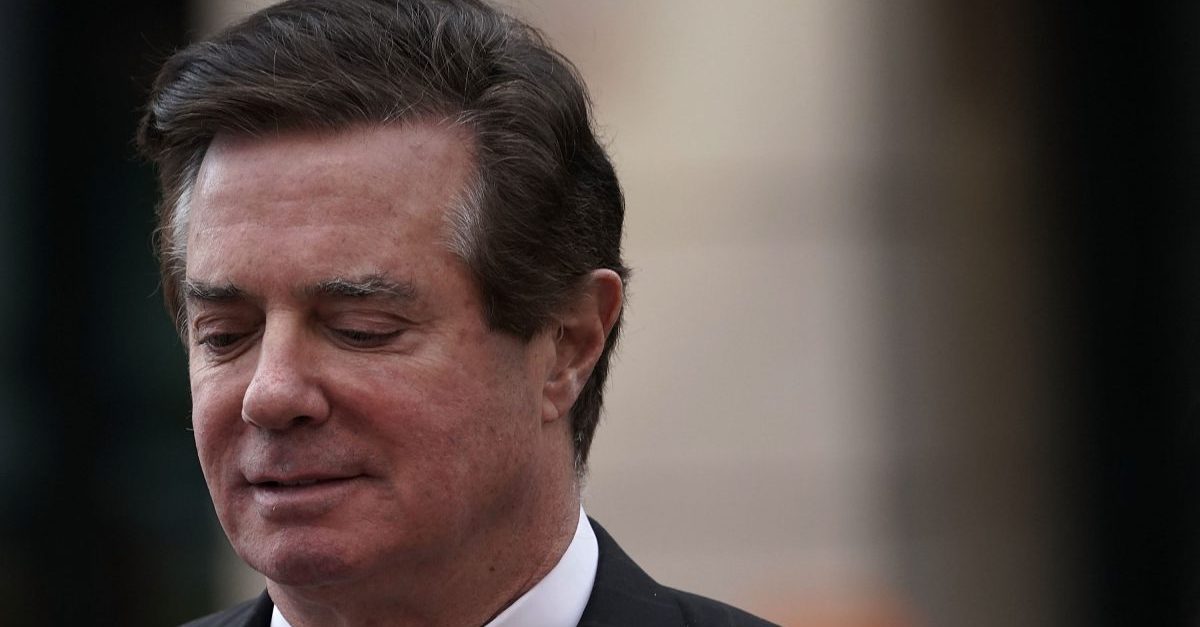
Former Trump campaign manager Paul Manafort‘s trial is about to get underway in Virginia federal court, with jury selection beginning Tuesday. It’s the first of two federal trials he faces, both related to work he did for the Ukrainian government. The current case is based on alleged bank and tax fraud related to the money earned for the Ukraine work (the other is for allegations including money laundering and failing to register as a foreign agent). Manafort’s associate Rick Gates was originally charged as a co-defendant, but since then he’s taken a plea deal and is cooperating with Special Counsel Robert Mueller. With a mountain of evidence against him, including potential testimony from his own associate, why hasn’t Manafort also cut a deal? Here are a few possible reasons why.
1. He’s counting on a pardon
Manafort has endured a lengthy and costly legal battle with Mueller thus far without caving and giving up information on President Donald Trump. He could be hoping Trump shows his appreciation for this later. If the Trump campaign did engage in any illegal activity related to collusion with Russia, it stands to reason that Manafort would know about it. That’s likely why Mueller was happy to give Gates a deal for the added lesser charge of lying to investigators; it would put pressure on Manafort to flip. Since he didn’t take the bait, his plan may be to see this whole thing through to the end (including the inevitable appeal, should he be found guilty), hoping that Trump will then let him off the hook.
2. Mueller isn’t offering much of a deal, if anything
There are several reasons why Robert Mueller might want this case to be meet its end in a trial instead of a plea. One is that maybe the information that he believes Manafort has isn’t worth granting him a plea to a lesser charge or letting him off with a light sentence. Perhaps he’s discovered that during Manafort’s brief time as Trump’s campaign manager (he wasn’t the first or the last to hold that position), Manafort wasn’t privy to any information that could lead to allegations that the campaign colluded with Russia in any illegal fashion. If Manafort can’t help Mueller’s ultimate cause, there’s not much of a reason to let the serious charges against him slide. Alternatively, Mueller could already have all the information he needs from other sources, in which case Manafort’s cooperation wouldn’t be worth much.
Another reason why Mueller may not be offering a deal at this point is because Manafort hasn’t taken any deal thus far. Now that the case is going to a jury, all offers may be off the table, and Mueller might be looking forward to making an example of the man who has been Mueller’s most high-profile defendant. Even though the charges in this case have nothing to do with the Trump campaign, Mueller may want to show the world what happens when you challenge him.
3. He wants Mueller to work for it
Special Counsel Robert Mueller secured guilty pleas from several people connected to the Trump campaign, such as Michael Flynn, George Papadopoulos, and Gates. Manafort is the big holdout, and he’s tried everything he can to get out of this without going to trial. Since he knows he’s going to prison (and potentially losing a fortune in forfeiture) whether he takes a plea or not, he could just be sticking it to Mueller by seeing this through to the end. It’s apparently had an affect so far, too.
A Bloomberg report from early July indicated that Mueller’s office has been hurting of late, when it comes to resources. Sources said that the Special Counsel’s Office has been using Justice Department resources, including DOJ lawyers and FBI agents instead of his own people. A reason for this is that there was an increasing number of court challenges that made it difficult for Mueller’s team to handle every aspect of the Russia investigation themselves. One of those big challenges has been Manafort, with his steady stream of court filings in both of his cases, requiring Mueller to respond with counterarguments in filings of his own.
If Manafort’s plan was to make Mueller work as hard as possible, he has succeeded.
4. He might still take a plea after all
A big reason why Manafort hasn’t pleaded guilty could be that he’s waiting until the last second, when all hope is lost. Plenty of criminal defendants fight up until their case goes to a jury, and then they plead guilty. The idea is that they’ll try any pre-trial method they can to get the case dismissed or pushed off, but once they’re out of options, they cut their losses and take a deal to avoid having to go through a trial that they know they’ll lose. As mentioned above, Manafort has certainly tried everything: he filed a motion to dismiss, he tried to delay the case, he tried to move the case to a more favorable location where there would have been a greater likelihood of Republican jurors. All of it failed. His last hope could be that the court in Alexandria, Virginia will not be able to come up with an impartial jury. If a jury is successfully selected, don’t be surprised if Manafort cuts a deal before opening statements begin.
Ronn Blitzer is the Senior Legal Editor of Law&Crime and a former New York City prosecutor. Follow him on Twitter @RonnBlitzer.
[Image via Alex Wong/Getty Images]
This is an opinion piece. The views expressed in this article are those of just the author.